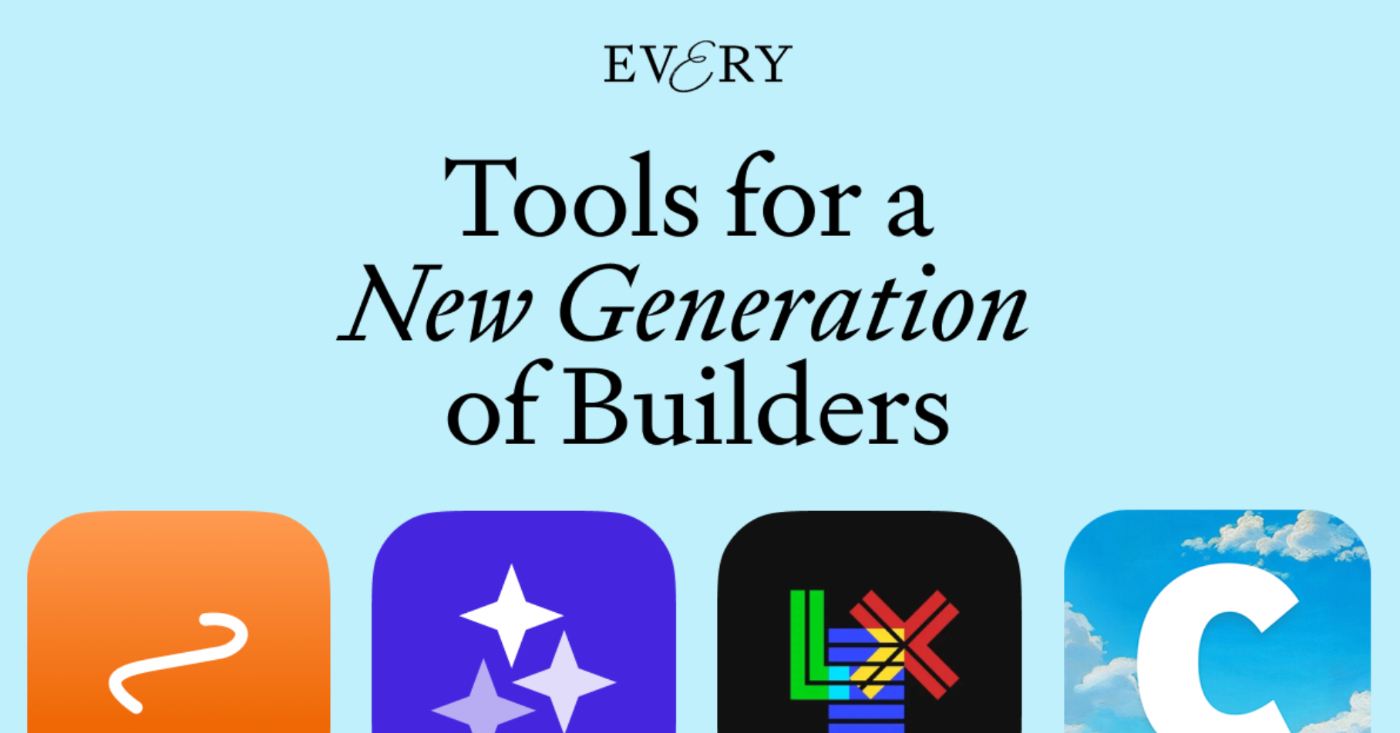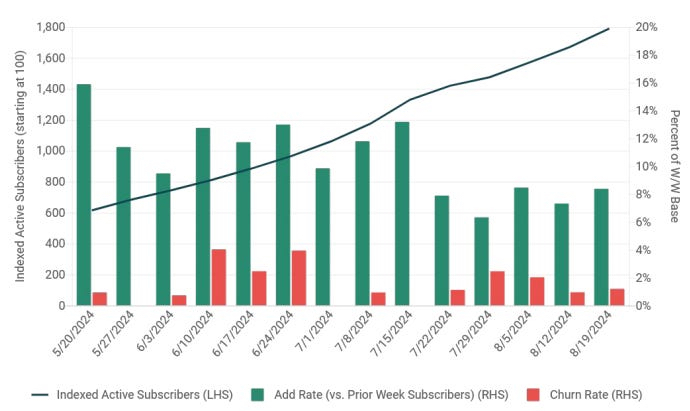
Hello, and happy Sunday! This week in Every, founders turned conventional wisdom about building companies on its head. On Monday, James Evans (whose company CommandAI was recently acquired) explained why it’s easier to disrupt a category than create one. On Tuesday, Every entrepreneur in residence (EIR) Edmar Ferreira unpacked how the unique risks of building AI products contradict the traditional startup playbook. We ended the week with another piece of counterintuitive wisdom on Friday, when Dan Shipper responded to Paul Graham’s latest essay about how AI will make both writing and critical thinking obsolete. It’s a fitting note of optimism on which to start the next week. Read on for more on that and everything else we published.—Kate Lee
Was this newsletter forwarded to you? Sign up to get it in your inbox.
Knowledge base
"Why Building in AI Is Nothing Like Making Conventional Software" by Edmar Ferreira/Source Code: In this first piece for Every’s Source Code column, EIR Edmar Ferriera explains how AI products come with a unique set of risks that flip the traditional startup playbook on its head. He breaks down the three key startup risks and explains why feasibility is the most challenging one for AI projects. Read this if you want to successfully develop an AI product.
🔏 "Why You Should Disrupt Categories, Not Create Them" by James Evans/Thesis: You may think your startup idea is revolutionary enough to create a new category of companies, but in reality, you’re more likely to be successful if you disrupt an existing one. In this first piece for Every’s Thesis column, James Evans argues that competing in established markets can lead to faster growth and easier sales. Read this if you're a founder looking to save years of hardship and deliver results sooner—especially in the age of AI.
"Writing as a Way of Thinking" by Dan Shipper/Chain of Thought: In his latest essay, Paul Graham argues that AI is going to endanger both writing and critical thinking. But Dan Shipper isn’t so sure. He argues that while writing is thinking, thinking isn't just writing. Managers already operate in an "allocation economy," and they still need to think critically. Read this if you want a more optimistic take on how AI will change the way we write and think.
🎧🔏 "Building an AI Brain for Venture Capital" by Dan Shipper/AI & I: Top-tier VC firm Union Square Ventures is building an AI operating system to capture their collective wisdom, and Matt Cynamon is the leading the charge. Matt demos a suite of tools—including The Librarian (a chatbot trained on 15,000 USV blog posts) and The Dream Machine (an AI art generator for meetings)—that are changing how USV operates. Listen to or watch this episode of AI & I to see how AI is enabling generalists to ship useful products quickly—and how a VC firm harnesses its accumulated knowledge to make investing decisions. View the full transcript.
🔏 "How to Teach AI to Understand Your Customers" by Chris Silvestri: You can’t read your customers’ minds, but AI might be the next best thing. Chris Silvestri, a copywriter who's helped over 50 companies grow, shares his "empathy engineering" framework for using AI to simulate and understand customers. Read this for a step-by-step guide on how to gather customer insights and feed them to AI in order to generate your ideal customer personas.
Sponsored by: Every
Tools for a new generation of builders
When you write a lot about AI like we do, it’s hard not to see opportunities. We build tools for our team to become faster and better. When they work well, we bring them to our readers, too. We have a hunch: If you like reading Every, you’ll like what we’ve made.
Data mining
The big company AI advantage. It’s still early, but adoption of Adobe’s AI tool, AI Assistant, is growing at a healthy clip:
Source: Yipit.Active subscribers for Adobe AI assistant (which the company started rolling out in February) have tripled since May, with exponential growth and decreasing churn. When it comes to “feasibility risk,” incumbents have a structural advantage against AI upstarts. If Adobe rolls out a beta AI feature that glitches, the worst thing that happens is that the customer stops using the feature. If, by contrast, an AI startup rolls out a glitchy AI product, the customer will never be heard from again—there are no second chances. The “test and learn” playbook is (for now) for “incumbent use only.”—Moses Sternstein
Keyword extraction
James Evans, who wrote about why category disruption is easier than creation, shared one good read:
📕 Portrait of the Artist as a Young Man by James Joyce: “I try to read it every year in the hope that reading about an intellectual coming-of-age will prevent me from becoming a non-young man set in my ways.”
Alignment
I celebrate myself. Walt Whitman is the greatest American poet. With no formal education or markers of early distinction, he was a working man writing poetry in his spare time. In 1855, he self-published Leaves of Grass, changing literature forever. Instead of copying American poets who mimicked the British, he embraced his “Americanness” and wrote what he saw: Manhattan’s streets, Brooklyn ferries, soldiers in the Civil War. It was America as he knew it—raw, loud, magnificent, contradictory. Two hundred years later, not much has changed. When I think of America, I think of Whitman, the embodiment of the American dream, where anything is possible. Like Whitman said: I am large, I contain multitudes. So does America.—Ashwin Sharma
Sentiment analysis
Edmar Ferreira’s piece about how building in AI is different from conventional software was thought-provoking:
“Interesting to consider with AI for legal services—part of the feasibility risk is ethical, and it's likely that current regulatory frameworks around unqualified practice are not going to be able to properly capture the real risk profile here.”—A lawyer
“One of the exciting things about the AI revolution-in-progress is how quickly the baseline models improve *without* your input. So one reasonable option, given the pace of foundational model improvement, is simply to set the project aside for even a mere 3–6 months. There is a very real chance it will be viable when you pick it back up again.”—A real estate executive
Want to chat? DM Dan or Evan on X.
Hallucination
Go touch some grass.
Source: X/Lucas Crespo.That’s all for this week! Be sure to follow Every on X at @every and on LinkedIn.
The Only Subscription
You Need to
Stay at the
Edge of AI
The essential toolkit for those shaping the future
"This might be the best value you
can get from an AI subscription."
- Jay S.
Join 100,000+ leaders, builders, and innovators

Email address
Already have an account? Sign in
What is included in a subscription?
Daily insights from AI pioneers + early access to powerful AI tools









.25.09_PM.png)
.05.38_PM.png)
.png)
Comments
Don't have an account? Sign up!
I think Portrait of the Artist as a Young Man is by James Joyce
@noam Thank you! Corrected.